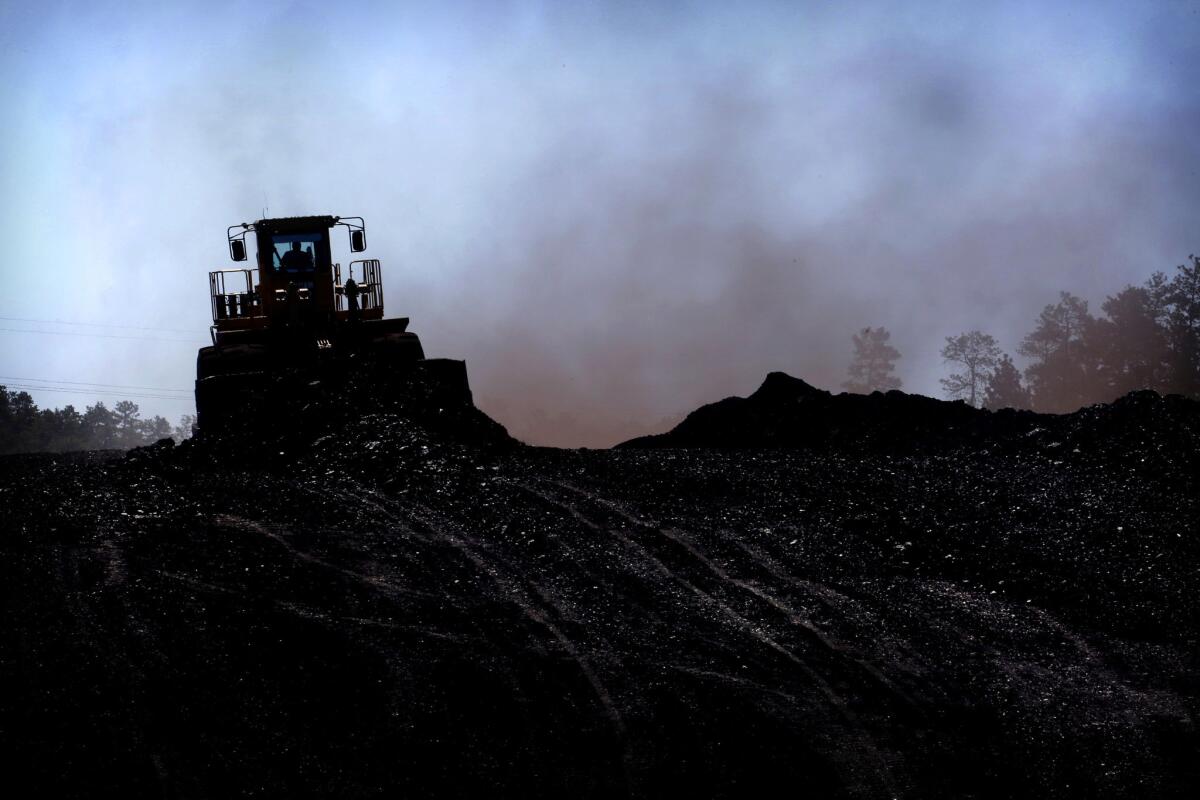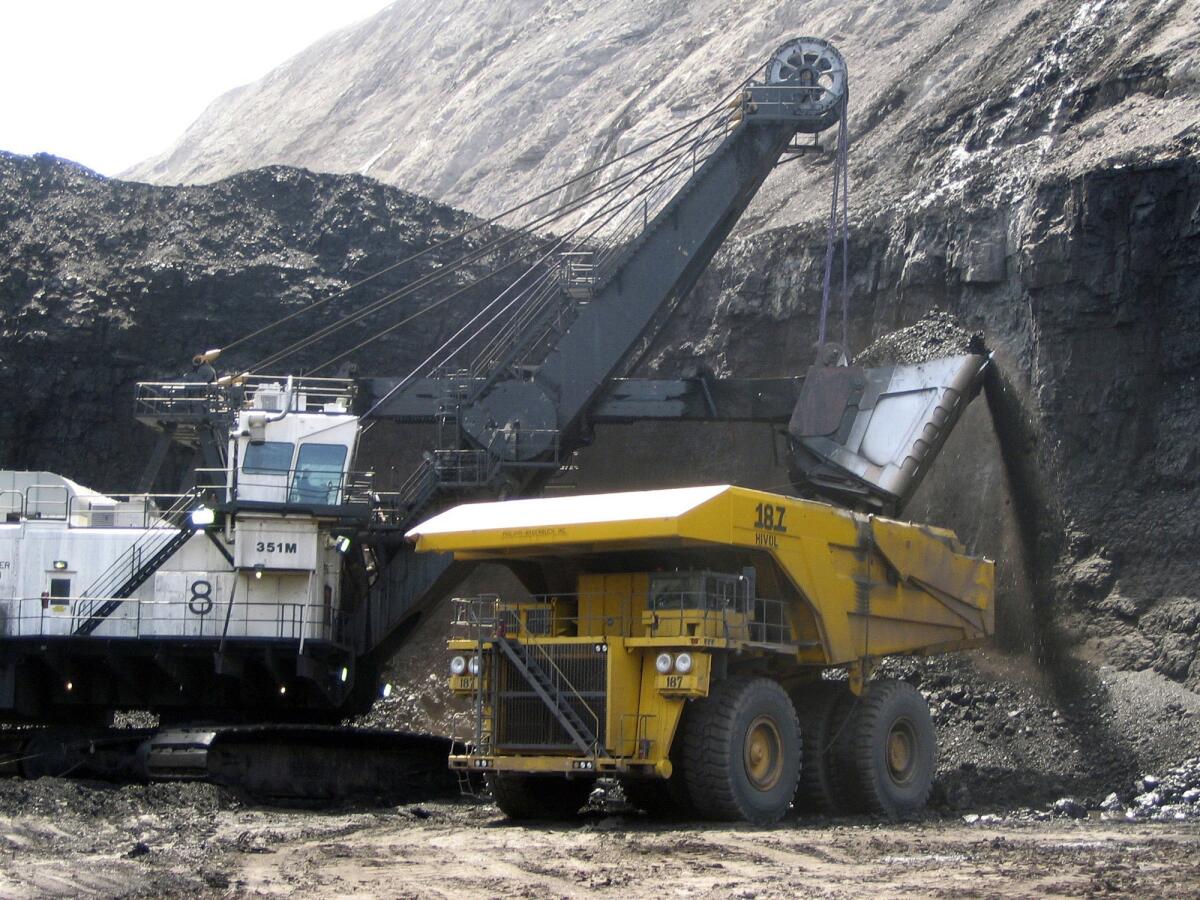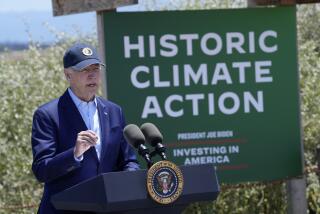Obama temporarily bans new coal leases on federal land

Coal dust fills the air at the Absaloka coal mine in Montana.
Angering coal supporters, the Obama administration announced a temporary ban on new coal leases on federal lands Friday as part of a broad environmental and economic review of the nation’s federal coal program.
The decision, which was lauded by environmental advocates, came three days after President Obama said in his State of the Union address that he would “push to change the way we manage our oil and coal resources, so that they better reflect the costs they impose on taxpayers and our planet,” adding: “We’ve got to accelerate the transition away from old, dirtier energy sources.”
Coal is America’s leading source of electricity but emits more carbon dioxide than other types of fuel, which has pitted industrial groups against environmentalist and Obama administration officials seeking to cut emissions to fight global climate change.
The new review announced Friday concerns the coal that private companies mine from federally owned land, which accounts for about 40% of all coal produced in the U.S. Most coal on public lands is in the Powder River Basin in Wyoming and Montana, and the nation’s coal leasing program has come under increasing scrutiny in recent years.
Administration officials have previously questioned whether taxpayers were getting underpaid for leases granted to private mining concerns, which officials said have included winning bids that paid out $1 a ton for taxpayer-owned coal.
A 2013 Interior Department inspector general report said taxpayers were losing tens of millions of dollars in revenue annually because the Bureau of Land Management was selling coal leases at rock-bottom prices, as The Times has previously reported.
See more of our top stories on Facebook >>
One Boston-based think tank estimated that leasing coal for prices below market value had cost taxpayers nearly $29 billion in revenue over the last 30 years. The Institute for Energy Economic & Financial Analysis study found that since 1991, nearly all the lease sales had only one bidder, and that companies offered to buy the coal rights to public land at cut-rate prices.
Administration officials said they hope to make the leasing program more transparent and more competitive with a review that will make suggestions that would “modernize” the nation’s coal program.

A shovel prepares to dump a load of coal into a 320-ton truck at the Black Thunder mine in Wright, Wyo.
“We haven’t undertaken a comprehensive review of the program in more than 30 years, and we have an obligation to current and future generations to ensure the federal coal program delivers a fair return to American taxpayers and takes into account its impacts on climate change,” U.S. Secretary of the Interior Sally Jewell said in a statement Friday.
Administration officials described the temporary ban on new leases on federally owned land as a “pause” that would not affect coal operations already underway on public land nor leases that have passed environmental reviews and are near finalization. In a conference call, Jewell said such holds on leases also happened during two reviews decades earlier under the Nixon and Reagan administrations.
There will be exceptions for metallurgical coal, which is used in steel production, and for emergency leases “when there is a demonstrated safety need or insufficient reserves,” the Department of the Interior said in a statement.
The move was immediately hailed by environmental groups, including Greenpeace, which said the federal leasing program “undercut” Obama’s climate agenda “by giving away our coal at subsidized rates, propping up this outdated energy source without regard for the damage done to communities or our climate.”
In 2014, Greenpeace released a report that said the Interior Department has leased 2.2 billion tons of coal under the Obama administration, accounting for 3.9 billion metric tons of carbon pollution, “more than the 3.7 billion tons that was emitted in the entire European Union in 2012,” the group estimated.
U.S. Sen. Jeff Merkley (D-Ore.), who advocates keeping fossil fuels “in the ground” to prevent climate change, said the halt in new leases could have positive long-term effects.
“A new coal lease can lock in 30 to 50 years of additional coal mining, so ending new leases for coal is a great place to start,” Merkley said in a statement.
Congressional Republican leaders opposed the Friday decision.
“Coal on federal land belongs to all Americans, but the president is denying people access to their own abundant, low-cost energy source,” U.S. House Speaker Paul Ryan (R-Wis.) said in a statement.
“The ramifications for the country will be terrible: lost growth, lost jobs, and lost revenue that would have gone to schools, bridges, and roads,” Ryan said. “The president’s policies have already ravaged coal country, destroying jobs and people’s way of life, and this will increase that suffering.”
U.S. Rep. Ed Whitfield (R-Ken.), chairman of the Energy and Power Subcommittee, accused Obama of “circumventing Congress” to “launch another unilateral attack on coal.”
Industry groups also opposed the move.
“The idea that future coal leasing requires a pause to evaluate environmental impacts defies credulity,” said National Mining Assn. President and Chief Executive Hal Quinn.
“Every federal coal lease sale and subsequent mining project must pass multiple levels and sequences of both federal and state evaluation,” Quinn said. “It is stunning that the administration believes a process that already pushes the development of coal projects beyond a decade needs more red tape and delays.”
Karen Harbert, president and chief executive of the U.S. Chamber of Commerce’s Institute for 21st Century Energy, said, “At this point, it is obvious that the president and his administration won’t be satisfied until coal is completely eradicated from our energy mix.”
Administration officials said their review and suspension of new federal leases will be carried out in the form of a “Programmatic Environmental Impact Statement,” with public sessions set to begin soon “to help determine the precise scope of the review.”
The fate of the review is expected to fall into the hands of the next president. The Interior Department plans to release an interim report on the review by the end of 2016, as Obama finished his presidency, but the full review is expected to take three years.
Follow @MattDPearce for national news
ALSO
Helicopters carrying 12 Marines collide off Oahu; no word on survivors
The ‘Dreamers’: They anger the GOP and power Democratic campaigns
Supreme Court to decide corruption case of former Virginia Gov. Bob McDonnell
More to Read
Sign up for Essential California
The most important California stories and recommendations in your inbox every morning.
You may occasionally receive promotional content from the Los Angeles Times.











